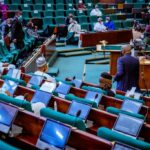Government Ministries, Departments and Agencies (MDAs) are established by law to deliver essential services to Nigerians in line with global standards and best practices.
By law, each of these agencies has specific functions and characteristics that make it unique in nature and is supposed to deliver on the mandate and tasks allotted to it without coercion, interference or influence from any quarters.
- Inside Nasarawa’s proposed N1.2bn teaching hospital rotting away
- How families of Kaduna train victims struggle to raise N100m ransom
For instance, the Revenue Mobilisation and Fiscal Commission (RMAFC) is an agency of government, which has its functions and powers as provided under paragraph 32(a-e) of part I of the third schedule of the 1999 Constitution of the Federal Republic of Nigeria (as amended).
The law empowers it to monitor the accruals to and disbursement of revenue from the federation account, and advise the federal and state governments on fiscal efficiency and methods by which their revenue can be increased.
Review, from time to time the revenue allocation formulae and principles in operation to ensure conformity with changing realities; provided that any revenue formula which had been accepted by an Act of the National Assembly shall remain in force for a period of not less than five years from the date of commencement of the Act.
Others are to determine the remuneration appropriate for political officeholders, including the president, vice president, governors, deputy governors, ministers, commissioners, special advisers, legislators and the holders of the offices mentioned in sections 84 and 124 of the constitution.
The commission is also mandated to discharge such other functions as are conferred on it by the Constitution or any Act of the National Assembly.
Unfortunately, key political appointees of the federal government interfere and impose decisions on MDAs, a development that has rendered some of them ineffective.
There has been a history of institutional rivalry among government agencies and sometimes rivalry between ministries and agencies and even Parastatals under the ministries.
There have also been situations where agencies of government that consider themselves superior to others influence the enactment of laws in order to appropriate the powers and functions of the less influential agencies to themselves.
Regrettably, the interference is without recourse to the laws establishing the institutions. Apart from infringing on the powers of the governing boards, it is also against corporate governance principles.
From one agency to the other, reports of ministers and other presidential aides pushing heads of federal departments and agencies around are incongruous.
Not only does this brazen attitude contravene public service rules, it also whittles down the powers of the chief executives to effectively discharge their responsibilities.
The result is that public service had become characterised by excessive partisanship, corruption, inefficiency, and ineffectiveness.
Thus, interfering with the functions and powers of the Revenue Mobilisation and Fiscal Commission by the Finance Act of 2021in favour of the Federal Inland Revenue Service is a clear case of disregard for the provisions of the Nigerian constitution, which gives RMAFC the power to demand and obtain relevant data, information or returns from government agencies.
This is impunity which must stop, and the more other agencies begin to fight for their rights in line with the provisions of the constitution, the better for Nigeria’s future.
A case where RMAFC defeated the FIRS, Attorney General of the Federation (AGF) and Minister of Finance Budget and National Planning as defendants on July 29, 2022, should serve as a deterrent to other political appointees and top government agencies.
RMAFC had sued the above three defendants for encroaching on its powers and functions and sought 6 reliefs at a Federal High Count in Abuja, in suit no: FHC/Abuja/CS/38,/2022.
The presiding judge, Hon. Justice Taiwo O. Taiwo in his judgement said, “The Plaintiff has asked 6 main reliefs and 4 alternative reliefs. I shall therefore grant and hereby grant reliefs 1,2,3,4 and 6 as prayed by the plaintiff. These are the main prayers. The alternative reliefs are hereby discountenanced. This is the judgment of the court.”
Therefore, for MDAs to operate effectively, they must have some form of autonomy. Without it, the workforce may become the “land of the working dead,” roaming endlessly in a zombie-like fashion, waiting to be told what to do next.
Granting MDAs autonomy does not mean working in isolation. It is not doing whatever you like whenever you like. It is not working without a net. In an autonomous organisation.
Government officials must reconcile with themselves that their major responsibility is to effectively and efficiently dedicate their time to the service of our dear country.
Mr Okoye is a Management Consultant and Social Commentator

 Join Daily Trust WhatsApp Community For Quick Access To News and Happenings Around You.
Join Daily Trust WhatsApp Community For Quick Access To News and Happenings Around You.


